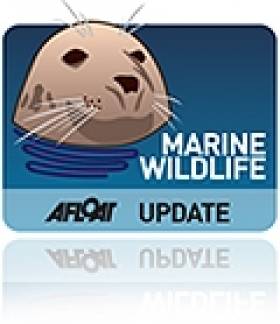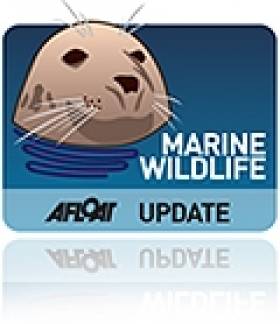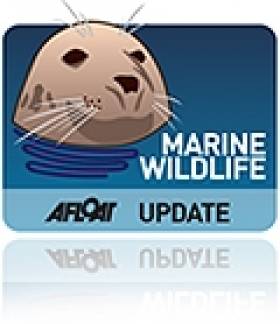Displaying items by tag: fin whale
'Nothing Can Be Done' for Stranded Whale in Baltimore Harbour
#BALTIMORE WHALE - Hopes are fading for an injured whale trapped in Baltimore Harbour, according to the Irish Independent.
It's being reported that the fin whale, which was injured on sharp rocks and beached off the pier in the West Cork harbour yesterday, is being left to die as it is too ill to be helped back to deeper water and too large to be euthanised.
It had been hoped that the whale would return to the sea under its own power by high tide but that sadly did not happen.
"Nothing can be done," Dr Simon Berrow of the Irish Whale and Dolphin Group (IWDG) told the Independent. "It can't be refloated or drigged. All you can do is let nature take its course."
The 40-foot whale became something of an instant attraction in Baltimore as crowds gathered in the harbour, as TheJournal.ie reports.
However, marine wildlife experts believe that the young whale must have been sick or malnourished to have made it so far from the open sea into the sheltered harbour.
The IWDG's Padraig Whooley also reiterated that most whale strandings end in death, and Brendan Cottrell of the Baltimore RNLI said the best thing was to do their best not to stress the animal further.
Elsewhere, a female fin whale stranded on a beach in Cornwall has died despite efforts to save her, according to the Daily Mail.
The 65-foot whale was put down by vets from British Divers Marine Life Rescue after she was found beached at Carylon Bay on the south coast on Monday morning. The whale was was described as "incredibly undernourised".
First Humpback Whale Sighting of 2012 Is a Newcomer
#MARINE WILDLIFE - Ireland's first humpback whale of the year has been spotted off the Wexford coast.
The sighting was made yesterday by whale-watchers among a pod of fin whales some three miles south of Hook Head, according to TheJournal.ie.
The Irish Whale and Dolphin Group (IWDG) has also confirmed that the humpback is a new sighting in Irish waters, and has been designated the reference HBIRL18.
RTÉ News has images of the humpback whale HERE.
Whale Carcass Battered by Strong Sea Gales in Sligo
#MARINE WILDLIFE - The Irish Independent reports on the carcass of a whale that was strewn on a beach in Co Sligo after it was swept into rocks by Monday's gale-force winds.
The 13-metre fin whale had been seen recently on a number of occasions in Lough Hyne, a saltwater lake near Baltimore in Co Cork.
On Monday it was spotted at Raughley in the north of Sligo, where it was found beached by Jimmy and Viera Stupakova after the treacherous conditions of the early part of this week.
The find marks the fifth recorded stranding of the species in Irish waters, and the first validated record of a fin whale in Co Sligo, according to OutdoorCommunity.ie.
It is not yet clear how the juvenile met its end, though initial investigations point to the whale not being long dead.
The Irish Independent has more on the story, including video, HERE.































































